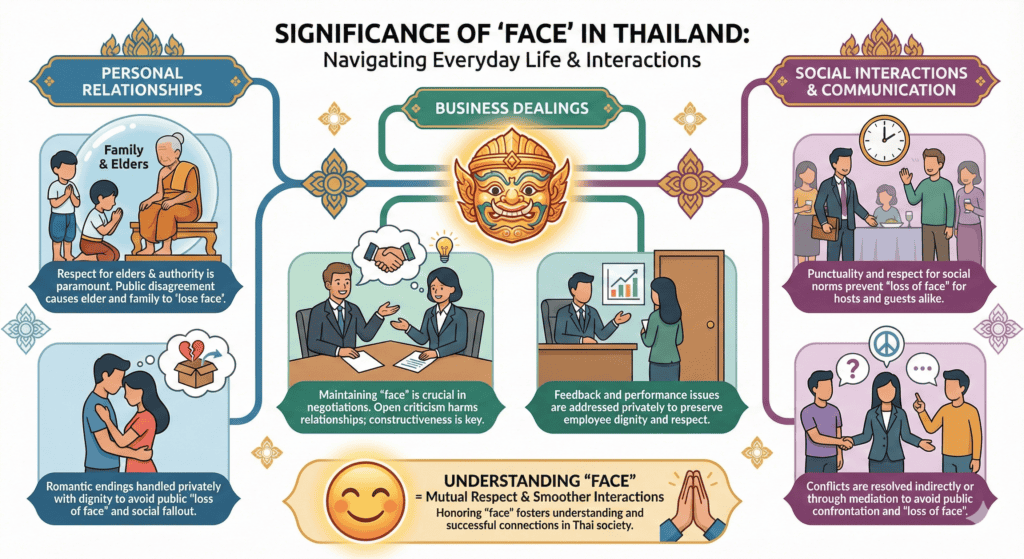Thailand’s Unspoken Rule: The Importance of Face in Thai Culture
If you’ve ever had the chance to visit Thailand, then you know firsthand how much respect and value Thai people place on face. Face isn’t just an idiom in this culture—it is a deeply rooted concept that influences every aspect of life from daily interactions to diplomacy. So why is “saving face” such an important part of Thai culture? In this blog post, we’ll explore the meaning behind honoring and protecting each other’s reputations in order to maintain relationships, increase trustworthiness among peers, ensure peace between different cultures, and so much more!
In Thailand, the term “face” can be compared to the Western countries’ concepts of reputation, prestige, honor, and social status. It is important to exhibit politeness, and consideration, and avoid offending or being intrusive in order to maintain one’s face.
Key Takeaways
- ‘Face’ is a crucial aspect of Thai culture, influencing a wide range of interactions, from personal relationships to business transactions.
- Not understanding or respecting ‘Face’ in Thailand can lead to serious social faux pas or business misunderstandings.
- By understanding the concept of ‘Face’, visitors can better navigate Thai society, communicate effectively, and build meaningful relationships with the locals.

Understanding ‘Face’ in Thai Culture
The Definition of ‘Face’
In Thai culture, the concept of ‘Face‘ is a multifaceted social construct that refers to a person’s dignity, reputation, social standing, and the respect accorded by others in the community. This concept is embedded deeply within Thai societal norms and plays a significant role in social interactions, whether personal or professional.
The idea of ‘Face’ for a Thai person goes beyond mere physical appearances and delves into the realms of honor, social appropriateness, and personal conduct. It represents an intricate combination of characteristics and behaviors that denote a person’s social worth and esteem.
Maintaining one’s ‘Face’ in Thai culture involves acting with appropriate manners, respecting elders and superiors, and fulfilling social obligations. Conversely, losing ‘Face’ can occur through public embarrassment, failure to meet societal expectations, or demonstrating disrespect towards others. Understanding this can be crucial for anyone aiming to build strong, respectful relationships within Thai society.
Historical and societal aspects that Shaped ‘Face’ in Thai Culture
The concept of ‘Face’ in Thai culture has been shaped by a combination of historical, societal, and religious influences. Thailand’s historical background as a traditionally agrarian society led to the development of a community-based culture, where individuals’ actions and behaviors could significantly impact their social standing and the community’s overall harmony.
Thai society has a well-defined hierarchy that is deeply entrenched in its history, starting from the monarchy down to ordinary citizens. This hierarchical structure has contributed to the importance of ‘Face’ in Thai culture, as it governs interactions between individuals of different social standings. For example, in a professional setting, a junior employee showing disrespect to a senior or not fulfilling their responsibilities appropriately can be perceived as losing ‘Face,’ thereby negatively affecting their reputation and social standing.
Moreover, the influence of Theravada Buddhism, the predominant religion in Thailand, plays a significant role in shaping ‘Face.’ Buddhism teaches principles of mindfulness, self-control, respect for others, and emphasis on communal harmony. These principles align well with the idea of maintaining ‘Face’ — one needs to be mindful of their actions, control their behaviors to not harm or embarrass others, respect societal hierarchies, and contribute to communal harmony.
To illustrate, consider a social event like a wedding. In Thai culture, attending a close friend’s wedding is not only a personal obligation but also a societal expectation. Failing to attend without a good reason may result in losing ‘Face’ as it’s seen as not respecting or valuing the friendship, which in turn could disrupt the harmony within the social circle.
Similarly, in a business context, if a manager publicly criticizes a subordinate, both parties lose ‘Face.’ The subordinate loses ‘Face’ due to public embarrassment, and the manager also loses ‘Face’ for not maintaining harmony and respect within the team, which is a highly valued aspect in Thai culture.
Overall, the concept of ‘Face’ in Thai culture is a testament to the society’s emphasis on respect, dignity, social harmony, and appropriate conduct. Understanding and respecting this cultural nuance is key to successful social and professional interactions within Thai society.
Significance of ‘Face’ in Everyday Life in Thailand

Personal Relationships and ‘Face’
‘Face’ holds a central position in the dynamics of personal relationships in Thai culture, and it’s a governing principle in daily interactions, behavior, and decision-making processes. Respect for the personal ‘Face’ of each individual is foundational to maintaining healthy, harmonious relationships. In families, for instance, the concept of ‘Face’ may determine how a Thai wife or family members interact with each other, given the emphasis on respect for elders and those in positions of authority.
For example, in a Thai family setting, a child is taught to always respect their elders. Disagreeing openly with an elder, particularly in a public setting, may lead to the elder losing ‘Face.’ This breach is not merely seen as a personal insult but also as a failure on the part of the family that didn’t instill appropriate values in the child, thereby causing the entire family to lose ‘Face.’
Similarly, in romantic relationships, if a person were to end a relationship abruptly or in a confrontational manner, it could be perceived as the person disregarding the other’s ‘Face,’ leading to a loss of respect and societal standing. It is, therefore, typical for Thais to handle such sensitive matters privately and with great respect for the other person’s ‘Face.’
Also, make sure to take a moment and read a fascinating article here about Lost in Translation: How To Effectively Deal With Culture Shock in Thailand. This article provides valuable insights and practical tips on how to navigate the intricate nuances of Thai culture, ensuring a more seamless and enjoyable experience during your stay. So, be sure to check it out and equip yourself with the knowledge to make the most out of your Thai adventure!
Business dealings and ‘Face’
In the context of business, ‘Face’ is a crucial aspect of professional interactions and negotiations. The importance of maintaining ‘Face’ can impact the communication style, decision-making process, and overall conduct of business.
As an illustration, if a foreign business partner were to openly criticize a Thai counterpart during a meeting, it would be considered highly disrespectful and cause the Thai individual to lose ‘Face.’ This could harm the business relationship, as the Thai counterpart may feel disrespected and less willing to cooperate or negotiate further.
Similarly, in a workplace, if a manager needs to address an employee’s poor performance, it would be done privately to prevent the employee from losing ‘Face.’ The manager would also choose their words carefully to provide feedback in a way that maintains the employee’s dignity and respect.
‘Face’ in social interactions and communication
In social interactions and communication, ‘Face’ has a pervasive influence, shaping the norms and etiquette in Thai society. The way people converse, resolve conflicts, or even celebrate often revolves around the preservation of ‘Face.’
Consider, for instance, a social gathering. If a guest were to arrive excessively late without notifying the host, it could be seen as the guest causing the host to lose ‘Face,’ as it may imply a lack of respect for the host’s effort and time. Consequently, the guest may also lose ‘Face’ within the social group due to this perceived disregard for societal norms and the host’s feelings.
Furthermore, ‘Face’ also plays a role in conflict resolution in Thai society. Conflicts or disagreements are often handled indirectly to avoid public confrontations that could cause someone to lose ‘Face.’ For instance, if two friends have a disagreement, they might have a mutual friend mediate the issue privately rather than arguing openly.
Understanding the significance of ‘Face’ in Thai culture can offer invaluable insights into the subtleties of Thai personal relationships, business practices, and social communication norms. Respecting and honoring the concept of ‘Face’ not only facilitates smoother interactions but also fosters mutual respect and understanding.
Case Studies
Examples of ‘Face’ influencing Thai behavior
Social Gatherings: During a dinner party, it’s typical for Thais to wait for the eldest or highest-ranking person to start eating before they begin. This practice stems from the concept of ‘Face,’ emphasizing respect for elders and those of higher social standing. If a younger individual were to start eating before an elder, it could cause the elder to lose ‘Face,’ reflecting poorly on the younger person’s upbringing and manners.
In Education: In a classroom, students may hesitate to ask questions or openly disagree with their teachers. This behavior is an extension of the ‘Face’ concept, where showing deference to authority figures is of high importance. A student challenging a teacher’s viewpoint could cause the teacher to lose ‘Face,’ and by extension, the student would also lose ‘Face’ for appearing disrespectful.
Business Negotiations: During business negotiations, Thai businesspeople might avoid saying ‘no’ directly to proposals they disagree with. Instead, they may use indirect expressions or postpone decisions to avoid confrontation and to ensure that all parties maintain their ‘Face.’
Consequences of not respecting ‘Face’
Damaged Relationships: In Thai society, not respecting ‘Face’ can significantly strain personal and professional relationships. For instance, a friend who openly criticizes another in a social gathering may cause the person to lose ‘Face.’ This disrespect can harm their friendship, and the critic might be seen as disrespectful, harming their reputation within their shared social circle.
Business Losses: In a business context, not honoring the concept of ‘Face’ can lead to lost opportunities or even failed partnerships. If a foreign business partner were to publicly criticize a Thai businessperson’s idea, the Thai businessperson could lose ‘Face,’ leading to a breakdown in negotiations and potential loss of business opportunities.
Social Exclusion: Individuals who frequently disregard others’ ‘Face’ might face social exclusion. Thai society places immense value on maintaining harmony and respect within the community, so those who continually disrupt this harmony by disrespecting others’ ‘Face’ might find themselves gradually excluded from social events and gatherings.
Understanding ‘Face’ in Thai culture and its influence on Thai behavior is essential for building successful relationships, whether personal or professional. Ignoring the concept can lead to strained relationships, lost opportunities, and social exclusion, underlining the vital role ‘Face’ plays in Thai society.
How to Respect ‘Face’ in Thai Culture
Do’s and Don’ts
Do show respect for hierarchy and status: Thai culture places high value on social hierarchies. Therefore, it’s essential to show respect towards individuals who are older or hold higher status, whether in personal relationships, business contexts, or casual social interactions.
Don’t openly criticize or confront others: Publicly criticizing or confronting someone, whether in a personal or professional setting, can lead to a significant loss of ‘Face.’ Instead, express concerns or disagreements privately and respectfully.
Do honor social obligations: Fulfilling social obligations, such as attending weddings or funerals, is seen as a mark of respect and a way to maintain ‘Face.’ Not meeting these obligations without a valid reason can lead to loss of ‘Face.’
Don’t violate personal space: Respect for personal space is a significant part of maintaining ‘Face.’ Unwanted touch, even with a positive and friendly attitude, can make someone uncomfortable and lead to loss of ‘Face.’
Do communicate indirectly in sensitive situations: To avoid causing someone to lose ‘Face,’ use indirect communication when discussing sensitive matters or delivering bad news.
Thais have a unique ability to discuss serious issues with a smile. It’s not just about politeness, but rather an accepting approach to important matters. Although our perspective may be biased, as we call Chiang Mai home, we believe that Northern Thailand embodies the epitome of “Sabai” — a state of complete relaxation and contentment.
A commonly used phrase in the Thai language is “Mai pen rai,” which loosely translates to “It’s no problem!” or “Don’t worry about it!” This Mai pen rai attitude permeates Thai culture, offering a valuable lesson in not letting minor issues cause unnecessary stress.
Advice on how to maintain and respect ‘Face’
- Understand the Concept: The first step in maintaining and respecting ‘Face’ is understanding its meaning in Thai culture. This requires awareness of the cultural values and social norms that shape the concept of ‘Face.’
- Adapt Communication Styles: When interacting with Thais, it’s essential to adapt your communication style to one that respects ‘Face.’ This often involves being polite, respectful, and non-confrontational, especially in public settings.
- Be Aware of Cultural Differences: Understanding that ‘Face’ may influence behaviors that may seem unusual to outsiders can help avoid misunderstandings. For instance, understanding that Thais might avoid direct refusal to maintain ‘Face’ can help in interpreting their responses more accurately.
- Be Mindful of Actions: Actions that could potentially cause someone to lose ‘Face,’ like openly criticizing them, should be avoided. Instead, handle such situations with sensitivity, considering how your actions may impact others’ ‘Face.’
For example, if you’re in a position of authority and need to provide negative feedback, do so privately and constructively, ensuring the individual’s ‘Face’ is not compromised.
Similarly, in social settings, if a Thai friend fails to keep a commitment, handle the situation with understanding and avoid confronting them about it publicly, which could cause them to lose ‘Face.’
In essence, respecting ‘Face’ in Thai culture largely revolves around demonstrating respect for others through your actions, understanding, and adjusting to the cultural norms and expectations, and communicating with sensitivity and politeness. This understanding fosters mutual respect and maintains harmony, crucial aspects of successful interactions within Thai society.

The Importance of Face in Thai Culture FAQs
What happens when ‘Face’ is not respected in Thai culture?
When ‘Face’ is not respected in Thai culture, it can lead to a variety of negative outcomes that range from personal to professional, and even societal levels.
Personal Relationships: Disregarding the concept of ‘Face’ can severely strain or even break personal relationships. For example, openly criticizing a friend or relative, especially in public, can lead to the person losing ‘Face’ and feeling deeply insulted. This can damage the relationship, potentially beyond repair, as the act is seen not only as a personal attack but also as a disregard for social norms.
Professional Consequences: In the professional realm, a disregard for ‘Face’ can hamper career progression and business relationships. For instance, if a manager were to reprimand an employee publicly, it would result in a loss of ‘Face’ for the employee and might create an uncomfortable work environment. On the other hand, the manager might also lose ‘Face’ for not maintaining harmony within the team, which could impact their leadership standing.
How can I respect ‘Face’ when visiting Thailand?
Visiting Thailand is an exciting experience, as it introduces you to the country’s rich culture and traditions. To ensure a pleasant trip and enjoy your stay in Thailand, respecting ‘Face’ should be at the top of your priority list.
Does ‘Face’ also affect business interactions in Thailand?
Yes, ‘Face’ plays a major role in Thai business interactions as well. To maintain positive business and ensure successful outcomes, it’s imperative to show respect for the concept of ‘Face.’ This means avoiding public criticism or confrontation, honoring social obligations, adapting communication styles to suit cultural norms, and being mindful of your actions at all times.
What are some key dos and don’ts to maintain ‘Face’ in Thailand?
Some key dos and don’ts to maintain ‘Face’ in Thailand include:
- Do show respect for hierarchy and status, honor social obligations, and communicate indirectly in sensitive situations.
- Don’t openly criticize or confront others, violate personal space, or act carelessly.
- It’s also important to understand the concept of ‘Face’, adapt communication styles to Thai culture, and be aware of cultural differences. This will help ensure that ‘Face’ is respected and maintained throughout your interactions with Thais.
By following these dos and don’ts, you can enjoy your time in Thailand while respecting its culture, traditions, and values.
Is the concept of ‘Face’ unique to Thailand or is it found in other Asian cultures as well?
The idea of “saving face” is crucial, as it involves avoiding any action or behavior that could result in someone (including yourself) feeling ashamed or humiliated, also known as “losing face” (เสียหน้า).
Although face-saving culture is prevalent in various Asian countries, Thailand is believed to be excessively sensitive about it compared to its neighboring countries. Some scholars, including Thai people, argue that this culture impedes the country’s growth by preventing constructive criticism and acknowledging past mistakes, which are necessary for progress.
What other concept in Thailand I should know about?
Sanuk, a fundamental aspect of Thai culture, encompasses the spirit of playfulness and wit that permeates life in Thailand. It encompasses delightful encounters with strangers on the street and ‘just the right moment’ or perfectly timed humorous puns and spontaneous and joyful meetings. This concept epitomizes the essence of joy and humor deeply ingrained in Thai culture.
Conclusion
Through understanding the Thai concept of ‘Face’, it is possible to strengthen and better navigate Thai society. It is essential to communicate effectively and form meaningful relationships with those around you. Be it between two individuals or at a business level, opting for a direct approach is not always ideal when navigating the complexities of the ‘Face’ concept in Thailand. Learning how to respect and save ‘Face’ can help avoid misunderstandings and instead build strong connections with Thais.
When done correctly, your understanding of this practice will show locals that you have taken the time to familiarize yourself with and understand their culture. Embracing ‘Face’ may be one of the key ways to finally cross boundaries and make unforgettable relationships that will last a lifetime. To get informed about adapting to life in Thailand, subscribe to our newsletter for the best information on living in this fascinating culture!






